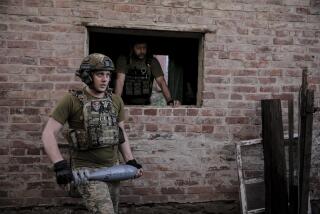Russia’s Deadly Junk Room
- Share via
As United Nations inspectors search Iraq for chemical, biological and nuclear weapons, barns in the Siberian town of Shchuchye store thousands of tons of VX, sarin and other nerve agents, along with 2 million chemical artillery shells small enough to fit in a suitcase, each containing enough poison to kill a stadium full of people.
Ridding the world of such weapons -- wherever they are -- must be a top priority for the United States. Fortunately, after considerable prodding, Congress has authorized millions to destroy the gases in Shchuchye and other weapons across Russia before terrorists get them.
A U.S.-Russian program to burn or otherwise disable chemical, biological and nuclear weapons has worked well for more than a decade. Several years ago Congress approved more money for this task, then refused to release it. In November, President Bush, with vocal support from Sen. Richard G. Lugar (R-Ind.), prevailed on Congress to authorize spending the $466 million it originally earmarked for the program, and last week Bush signed two waivers to free those funds.
It was Lugar and then-Sen. Sam Nunn (D-Ga.) who set up the arms destruction program in 1991. Russia was having difficulty even paying guards to stop thieves from snatching the weapons, let alone financing the program. So the U.S. has spent $7 billion over 11 years to destroy thousands of nuclear warheads and hundreds of ballistic missiles, bombers and submarines in the former Soviet Union.
Some in Congress worried all along that money was being wasted and urged Russia to chip in -- which it has. Critics also have demanded that the money be tied to ending human rights abuses in Russia and that the Kremlin stop helping build nuclear reactors in Iran. Those are good goals, but the place to pursue them is outside the weapons destruction program.
The Bush administration reviewed the Nunn-Lugar program upon taking office and found it worth the money. Last May, at a Moscow summit with Russian President Vladimir V. Putin, Bush reiterated that the two countries should do everything possible to prevent the spread of nuclear, chemical and biological weapons.
The waivers give Bush the authority to set aside requirements that Russia meet certain conditions before receiving the money, such as establishing a better human rights record. However, he still must report each year on Russian progress in meeting congressional stipulations.
Keeping weapons out of terrorists’ hands is vitally important to U.S. national security. The Nunn-Lugar program has been effective, but Congress and Russia (and, for that matter, any nation loath to see its people killed en masse) need to come up with billions more to rid the world of this deadly arsenal.
More to Read
Sign up for Essential California
The most important California stories and recommendations in your inbox every morning.
You may occasionally receive promotional content from the Los Angeles Times.













